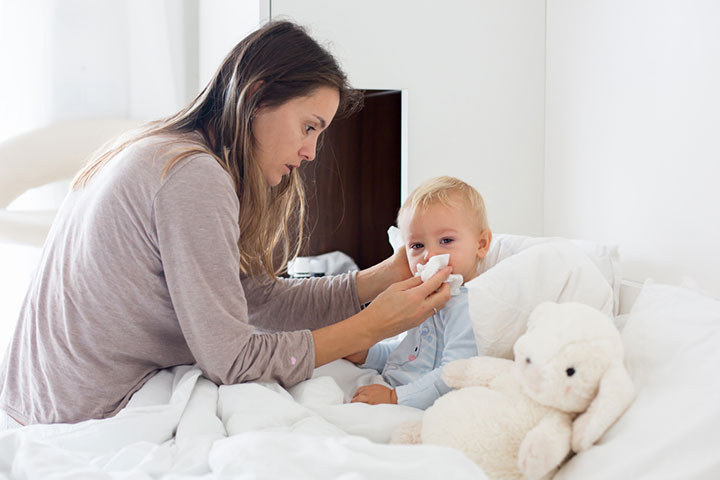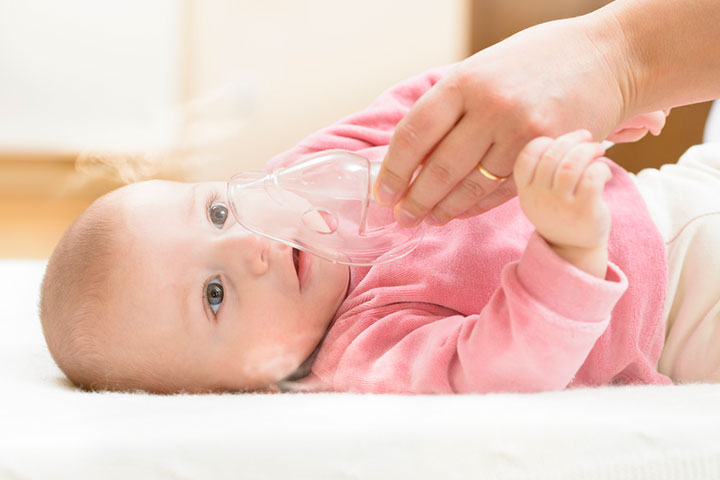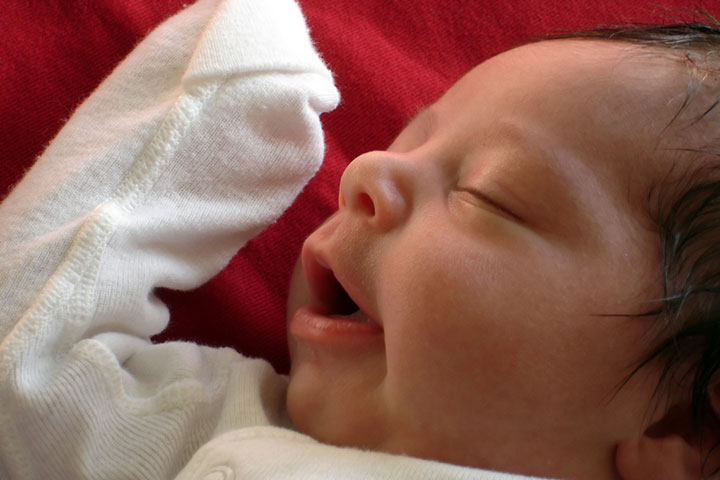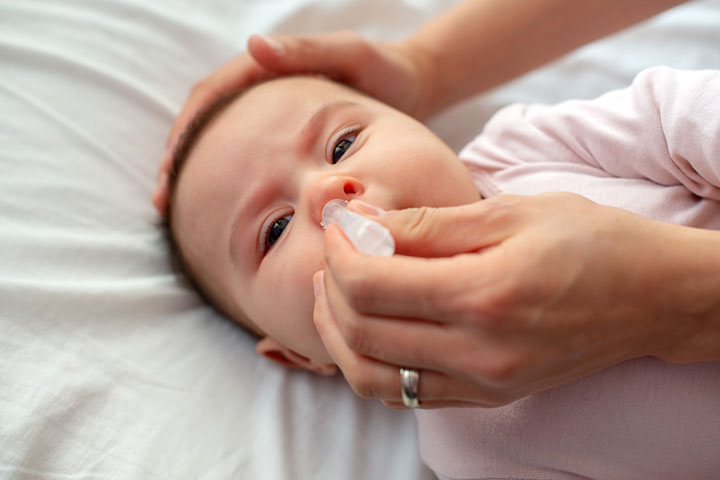Babies snoring and snorting may not be common, but it is normal and can happen for various reasons. Typically, snoring is heard as a rattling sound while breathing (1). Although most people commonly experience it, hearing a baby snore may raise concerns.
Scroll through to learn about snoring and snorting in babies, including its causes and coping strategies to help your little one sleep better.
Is Snoring And Snorting Normal In Babies?
Yes, they are normal in most babies, including newborns. One in ten babies snore nearly every night (2). Snoring occurs when the airway in the throat gets obstructed or constricted, making the inhaled air make the throat tissues vibrate. The baby’s muscles, including neck muscles, relax during sleep, thus pressing against the posterior wall (back wall) of the airways causing the baby to snore. However, it may not be this simple.
The American Academy of Pediatrics recommends parents to be aware of their baby’s snoring pattern (3), as it is vital for the timely detection and resolution of underlying problems if any.
NOTE: Snorting is another sound that babies make when they are suffering from clogged airways. It is a complementary sound to snoring.
What Causes Snoring And Snorting In Babies?
The frequency and chances of a baby snoring and snorting diminish as they grow older. However, it can be induced due to certain anomaliesiXHealth conditions that are abnormal or unusual and could be a symptom of a medical condition:
1. Blocked nostrils
Blocked nostrils are common among babies since infants cannot yet blow the mucus out of their nose. A blocked nostril can also happen due to anatomical abnormalities. These are normally rare but can be serious, for instance choanal atresia(4). It is a congenital conditioniXA medical ailment present since birth, usually caused by genetic and environmental factors where a bony or cartilaginous structure blocks the back of a nostril. This may result in a sparse flow of air through the nose, making the baby snore during sleep resulting in a whistling or wheezing or stridor sound. There is also a condition called deviated nasal septum, where one nasal passage is straight while the other one is crooked. This narrows the passage of one nostril and may lead to snoring and snorting.
Symptoms: The baby may show discomfort in breathing and have a runny nose all the time. A constricted nasal passage may make the baby breathe from the mouth.
Treatment: Surgery can correct the condition by removing the bony structure that obstructs the nostril. If the bone cannot be removed, a hole is drilled into the bone, and a stent is inserted to prevent regrowth. For deviated nasal septum, surgery can easily straighten the nasal passages. If the baby’s nose is blocked by mucus, then a medical practitioner will remove it using a nasal pump.
2. Cold and drooling
Cold may cause an accumulation of mucus in the nostril and result in snoring (5). A cold may lead to nasal congestion, which can cause airway constriction, thus making the baby snore during sleep. Also, teething babies may salivate a lot, and this drool can trickle to their nasal cavity when they are lying on their back, making them snore.
Symptoms: If the baby has a cold, then they may show other symptoms of a cold such as a runny nose and perhaps mild fever. If they are teething, then they might drool a lot.
Treatment: A simple nasal pump and saline solution can be used under medical supervision to treat the nasal blockage.
3. Asthma and allergies
Asthma and allergies can also trigger snoring and snorting, although they are not the only symptoms of asthma (6). Asthma often has a direct connection with respiratory allergies, and thus allergy-induced asthma may lead to snoring. According to the CDC’s National Asthma Data, asthma affects 1.9% of children between zero and four years. Specifically, out of a pediatric population of 4,675,475 children in this age group, 369,646 have been diagnosed with asthma.
Symptoms: The baby will show all the other major symptoms of asthma, such as shortness of breath and quick fatigue while playing.
Treatment: Asthma cannot be cured but can be effectively managed with easy-to-administer respiratory medicines or decongestants.
4. Enlarged adenoids or tonsils
An infection of adenoidsiXTissues located at the back of the nasal passage that trap harmful bacteria entering the mouth and the nose and tonsilsiXMass of tissues present at the top of each side of the throat that trap harmful bacteria and prevent infection can cause constricting pressure on the airways (7). As mentioned earlier, this can lead to sleep apnea.
Both adenoids and tonsils are part of the lymphatic system, which plays a major role in protecting the respiratory system from infections, but they are themselves vulnerable to infections. An infected adenoid or tonsil will expand in size and obstruct the tiny airways of the baby, causing them to snore and snort.
Symptoms: Enlarged tonsils can be easily spotted near the lateral side of the throat, inside the baby’s mouth. An adenoid is not visible through the mouth, and enlargement can be diagnosed through symptoms like chronic mouth breathing, open jaw, and troubled breathing through the nose. The enlarged adenoid can be seen on a lateral x-ray.
Treatment: Tonsil and adenoid infections can be treated with antibiotic medication. In the case of severe infections, the tissue may have to be surgically removed.
5. Obstructive sleep apnea
This is a leading cause of snoring in babies. Obstructive sleep apnea happens when a baby’s airway is partially or completely obstructed when the anterior section of the airway presses against the posterior section. The air that passes through the airway then vibrates the neck tissues, causing snoring.
Sleep apnea is often caused by the accumulation of mucus in the baby’s airways or due to other problems like enlarged adenoids or tonsils. Sleep apnea in the long term may also cause hypoxia when there is a drop in the level of oxygen during sleep.
Symptoms: Snoring every day is one symptom of sleep apnea. The baby wakes up with a start at least once during the sleep, gasping for breath, coughing and suffocating. This is accompanied by snorting, sometimes.
During the daytime, the child may appear excessively sleepy, even in the absence of any other medical issue.
Treatment: Babies have developing brains, which cannot be devoid of oxygen even for a few seconds. Therefore, the condition needs swift medical attention. A doctor will look at the underlying cause for sleep apnea (obstruction, mucus, etc.) and suggest a treatment. Surgery is required only in a few extreme cases. Usually, the snoring subsides without any invasive medical intervention.
6. Genetic and neuromuscular disorders
A baby may snore due to weak muscle tone and facial features caused by genetic disorders such as down syndrome. This condition causes an enlarged tongue, flattened nose, and smaller jaw – all that may constrict the airways. Some neuromuscular disorders such as cerebral palsy or muscular dystrophy loosen the tongue muscles causing it to fall back and obstruct the airway (8).
Symptoms: A baby will show other classic symptoms of these genetic and neuromuscular disorders. Snoring itself is not a leading symptom of these disorders.
Treatment: There is usually no treatment for these conditions, but parents can learn to manage them with training by a medical practitioner.
A doctor can effectively diagnose each of these conditions. Once your baby is on course with the treatment, you need to ensure that they get the medicines on time.
Sometimes, what sounds like the baby snoring may be something else. Find out more next.
When Does It Sound Like Snoring But It Is Not?
There could be times when the baby seems to be snoring, but the sound originates from the baby’s throat. This is called stridor, which is the medical term for noisy breathing. This can be due to the following reasons.
- Stridor is quite commonly caused by laryngomalacia, which is predominantly a congenital condition, where the soft cartilaginous lining atop the upper larynx begins to fold inwards, eventually collapsing into the airway. The baby will usually breathe noisily with a sound that resembles snoring. It originates from the larynx, where air meets resistance due to constriction causing the vibration of the tissue.
- Symptoms: The major symptom of laryngomalacia is noisy breathing and loud snoring-like sound from the throat when the baby is asleep. The baby may even wheeze while breathing out and snore while breastfeeding or just after being fed. It happens because babies do not have the ability to swallow and breathe simultaneously, as the larynx is positioned higher in their neck (9).
- A constricted larynx causes the sound when the baby breathes during feeding. Keep in mind, though, that it is not exactly snoring since the vibrations are much lower down the airway than they are in actual snoring.
- Treatment: Laryngomalacia often cures on its own, and in most cases, no medical intervention is required. Besides being congenital, this condition can be triggered by gastroesophageal or acid reflux, in which case the regurgitated acid inflames the cartilages of the larynx, causing them to collapse and constrict breathing. A doctor will thus treat reflux to alleviate the laryngeal inflammation. In severe cases, a surgery called supraglottoplasty may be required. It involves trimming of the excess fold tissue and making more room for easy airflow.
While these conditions warrant medical attention, there are certain situations where you must take your little one to a doctor quickly.
When To See A Doctor?
Following are some scenarios when you must promptly take your baby to a doctor (10):
- When the breathing is erratic: If the baby stops breathing for several seconds while snoring, then there is something serious going on, and you must not wait for their snoring to subside on its own. Staying breathless, even for a few moments, can have an adverse impact on the baby’s internal organs.
According to Dr. Bidisha Sarkar, “Babies born extremely premature (less than 28 weeks) or weighing less than one kilogram are at the highest risk of developing respiratory distress syndrome (RDS). RDS can cause breathing difficulties in fragile newborns and, if not treated quickly, can lead to serious complications.”
- When the baby snores and snorts frequently/every time they sleep: Some amount of snoring and snorting is normal, but if they snore every time they sleep, and for weeks and months, then it could be an indicator of an underlying medical problem.
- When the sound of snoring and snorting is shrill or too loud: You know something is not right when the snoring sounds like noises that pierce your ears. Loud snoring for a tiny baby is not normal, and you should get a doctor to look.
- When snoring is interfering with the sleep: If snoring keeps them awake or makes it difficult for them to enjoy continuous sleep, then get them checked by a pediatrician.
Tips To Control A Baby’s Snoring And Snorting
Here are some basic procedures that you can follow to control snoring and snorting in your baby (11):
- Make them sleep in the correct position: The best thing you can do is to maintain the baby in the correct sleep position. Adults are usually recommended to sleep on their side to prevent snoring, but this position is not safe for the baby, so never try that out. The best position for your baby’s sleeping is on their back. When lying on the back, you can tilt their head in one direction to mitigate the chances of airway constriction. Keep alternating and tilt the head to different sides at regular intervals.
- Keep allergens away: Maintaining a clean sleeping environment helps prevent exposure to potential allergens that may cause cold, allergies, and other respiratory problems that lead to snoring and snorting. Keep the baby’s bedroom well ventilated.
- Use a humidifier if conditions are dry: Dry air can irritate the baby’s developing airways, and if the air is too dry, you can consider using a humidifier. Humidifiers are devices that pump water vapor in the air to maintain an optimum level of humidity for easy breathing. It does not treat snoring and snorting but can help make breathing more comfortable for the baby.
- Use saline drops or aspirator: If the baby has a stuffy nose that’s causing snoring, cleaning the nose should be the immediate resort. To clean the nose, you can use saline drops. However, the use of saline drops must only be done under pediatric guidance as they could be medicated (12). You can also check about using a nasal bulb syringe or an aspiratoriXA medical suction device used to remove mucus and fluids from the body to remove the mucus. This will open the baby’s nasal passage and could possibly provide relief from snoring too.
Baby snoring and snorting is normal, but you should note your little one’s snoring pattern to determine the precise cause. It will help detect and treat any underlying problem early and prevent adverse complications. To ensure the baby’s safety, follow the prescribed treatment and avoid trying remedies or over-the-counter (OTC) snoring medicines. Making the baby sleep in the correct position, using saline drops or aspirators, and keeping the baby away from allergens are some common ways you can control the baby’s snoring and snorting.
Key Pointers
- It is crucial for parents to be mindful of their baby’s snoring pattern, as it enables timely identification and resolution of any underlying problems.
- Snoring in babies can be caused by factors such as congestion, enlarged tonsils, or asthma.
- If the baby’s breathing is erratic or interferes with their sleep, consult a doctor at the earliest.
- Putting a baby to sleep in the correct position and using a humidifier can help manage snoring.
Check out this interesting and informative video on newborn breathing. Learn what’s normal and what’s not, so you can keep your baby safe and healthy.














